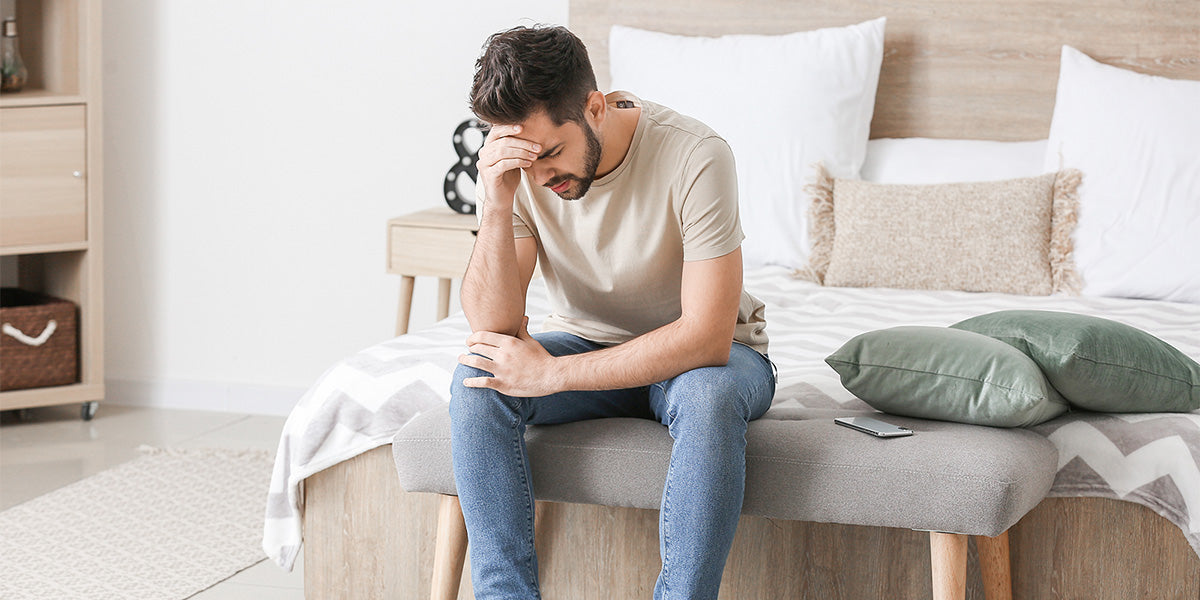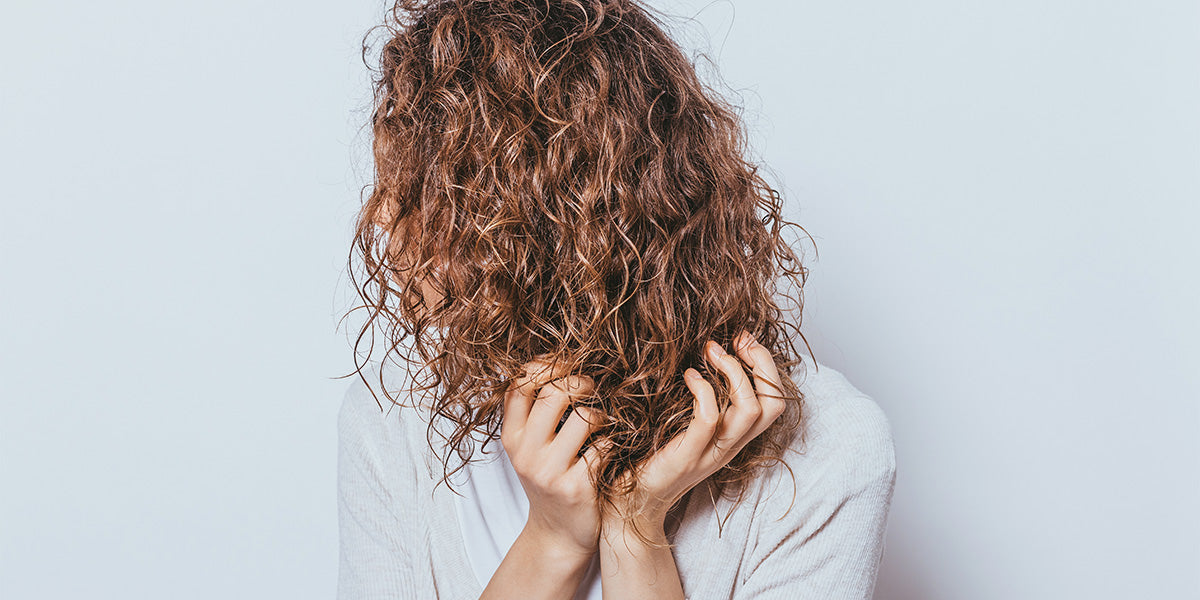For many, hair is a huge part of self-identity and going through hair loss can sometimes feel like a part of your identity is being taken away. Most people know somebody who has gone through or is currently experiencing male pattern balding. But we rarely talk about how it can affect men’s self-confidence and the effects this can have on their mental health.
There are real psychological impacts that come with male pattern baldness—these aren’t just in your head. Here’s what you can do if you’re feeling depressed about going bald.
The psychological impact of hair loss
Male pattern baldness (also known as androgenetic alopecia) is the most common form of hair loss and 35-50% of men will experience it by the age of 50 (Asfour et al, 2023). For many, the onset of a receding hairline can trigger stress and anxiety, with men fearing that hair loss will make them less attractive. Based on market research conducted by XYON, 31% of men who haven’t yet experienced hair loss, are very concerned about developing it in the future. This fear likely stems from the social stigmas surrounding male hair loss, with research showing that hair contributes significantly to physical attractiveness (Patzer, 1988).
Despite male pattern baldness being so common, the societal stigmas surrounding it remain stubbornly in place and these can often be psychologically damaging. As well as the fear of judgement from other people, many men experience reduced self-esteem and self-confidence with hair loss. In some cases, especially if someone has a predisposition for or family history of mental health disorders, this can lead to depression and anxiety.


Balding doesn't have to be inevitable.
Get ahead of hair loss with our hair loss solutions and team of hair loss experts.
Depression and hair loss
Depression can affect all aspects of life and can be associated with feelings of low self-worth, hopelessness about the future and no longer enjoying activities that were previously enjoyable. Research surrounding the psychological impact of hair loss on men has consistently found that men report male pattern baldness as having a significant effect on their quality of life (Gupta et al, 2019). A huge part of this is down to the impact on self-esteem, which if not addressed, can lead to signs and symptoms of depression. A 2005 study found that 22% of men said their hair loss had a negative impact on their social life and 21% reported feeling depressed (Alfonso et al, 2005).
Hair loss can lead to low self-esteem
In addition to potentially increasing the risk of developing depression, hair loss can have negative effects on self-esteem. One study found that two-thirds of men experiencing androgenetic alopecia reported their thinning hair to have a significant impact on self-esteem (Danyal et al, 2018), self-confidence and a reduced satisfaction in body image. The stage of hair loss appears to be relevant, with correlations between a worsening degree of hair loss and increased cases of low-self-esteem and depression (Wells et al, 1995). Younger men were also more profoundly affected.
The research surrounding male pattern baldness, is typically focused on treatments and the mental health impact is often minimized. Further studies to explore this link may be beneficial to those suffering from pattern hair loss and compel them to seek treatment for their hair and any underlying mood issues.
Anxiety and hair loss
Feeling depressed about your hair loss can often be coupled with feelings of anxiety and concerns about social situations, often referred to as social anxiety. Anxiety amongst men is not heavily spoken about, yet it is one of the most prevalent mental disorders experienced by men (Fischer et al, 2023). Studies have shown that people living with alopecia are at a higher risk of developing social anxiety (Ruiz-Doblado et al, 2003) and men living with male pattern baldness are no exception.
The fear of judgement in social situations can feed into anxious feelings and can in some situations, cause men to isolate themselves. For men with hair loss, the fear of social rejection when looking for a partner or even during a job search (Kranz et al, 2019) can also fuel symptoms of anxiety. These symptoms may include:
- Feeling restless and tense
- Feeling a sense of panic
- Physical symptoms such as, increased heart rate and sweating
If you are feeling anxious about your hair loss, it’s important to recognize that you’re not alone and there’s a good chance that you know people in your life who are going through similar things. There are steps you can take to address your hair loss and the impact it has on your mental health.
What can I do if I'm feeling depressed about my hair loss?
The first thing you can do if you’re struggling with hair loss is speak to a medical professional to get a diagnosis and discuss your treatment options. A 2005 study investigating the psychological impact of hair loss in men reported that less than 10% were pursuing treatment (Alfonso et al, 2005). We want to emphasize that in many cases, you can do something about your hair loss and there is no shame in exploring your options or wanting to feel better about yourself.
Medications for hair loss
Finasteride and dutasteride are examples of clinically proven medications that can be used to treat male pattern baldness. They work by blocking production of the hormone dihydrotestosterone (DHT), which can help prevent the shrinking of hair follicles (a process called miniaturization). Over time, these shrunken hair follicles become incapable of producing healthy, new hairs. This is what leads to the classic signs of thinning, or in advanced cases, the typical balding pattern seen in male pattern hair loss.
Seeking help for mental health
Your hair shouldn’t dictate how you feel every day and seeking help for your mental health may help you feel happier and more confident. There are treatments available if you are suffering from anxiety and depression, such as medications and therapy, but the first step is to recognize your symptoms and ask for help.
You may also find it helpful to speak to the people around you, like trusted friends or even a family member. In fact, male pattern baldness is a highly heritable condition. If you have other family members that have experienced this, then there’s a chance you might develop it as well. You could try talking to them about when their hair loss started, whether they’ve ever tried to treat it and how they ultimately felt about losing their hair.
Takeaway: depression and hair loss
Feeling depressed about going bald is not uncommon and it’s nothing to be ashamed of. Losing your hair can often equate to a loss of self-confidence and self-esteem, but it's important to acknowledge these feelings and seek help, because there are treatment options available. Remember, your hair shouldn’t determine your day. We’re here to help you take back control and live life to the fullest.![]()
Dr. Christina Han, MD FRCPC
Canadian and U.S. board-certified Dermatologist
XYON: Medical Director
Education
Dermatology (Postgraduate Residency) — University of British Columbia (UBC), Canada — 2012
Doctor of Medicine (MD) — University of British Columbia (UBC), Canada — 2007
Bachelor of Science (BSc), Microbiology & Immunology — University of British Columbia (UBC), Canada — 2002
Additional Training
Additional dermatological training — Yonsei University, Seoul
Focus areas: dermatological and laser surgery; skin cancer treatment
Board Certification
Canadian board-certified dermatologist
U.S. board-certified dermatologist
References List
Asfour, L., Brito, M.D., Al-Janabi, A., Haw, W.W.Y., Johnson, A., Flohr, C., Yiu, Z.Z.N. (2023). Global guidelines in dermatology mapping project (GUIDEMAP): a systematic review of alopecia areata clinical practice guidelines. Clinical and Experimental Dermatology, 48(2), 100-107. https://doi.org/10.1093/ced/llac025
Alfonso, M., Ritcher-Appelt, H., Tosti, A., Viera, M.S., Garcia, M. (2005). The psychosocial impact of hair loss among men: a multinational European study. Current Medical Research and Opinion, 21(11), 1820-36. https://doi.org/10.1185/030079905x61820
Danyal, M., Shah, S.I.A., Hassan, M.S.U., Qureshi, W. (2018). Impact of androgenetic alopecia on the psychological health of young men. Pakistan Journal of Medical & Health Sciences, 12(1).
Fisher, K., Rice, S.M., Oliffe, J.L., King, K., Seidler, Z.E. (2023). Young men and anxiety: Resisting, reckoning and responding. Social Health & Illness, 45(7), 1462-1482. https://doi.org/10.1111/1467-9566.13641
Gupta, S., Goyal, I., Mahendra, A. (2019). Quality of life assessment in patients with androgenetic alopecia. International Journal of Trichology, 11(4), 147-152. 10.4103/ijt.ijt_6_19
Kranz, D., Nadarevic, L., Erdfelder, E. (2019). Bald and bad? Journal of Experimental Psychology, 66(5), 340-354. https://doi.org/10.1027%2F1618-3169%2Fa000457
Patzer, G.L. (1988). Psychological and sociologic dimensions of hair: An aspect of the physical attractiveness phenomenon. Clinics in Dermatology, 6(4), 93-101. https://doi.org/10.1016/0738-081X(88)90072-7
Ruiz-Dobaldo, S., Carrizosa, A., Garcia-Hernandez, M.J. (2003). Alopecia areata: psychiatric comorbidity and adjustment to illness. International Journal of Dermatology, 42(6), 434-437. https://doi.org/10.1046/j.1365-4362.2003.01340.x
Wells, P.A., Willmoth, T., Russel, R.J.H. (1995). Does fortune favour the bald? Psychological correlates of hair loss in males. British Journal of Psychology, 86(3), 337-344. https://doi.org/10.1111/j.2044-8295.1995.tb02756.x




